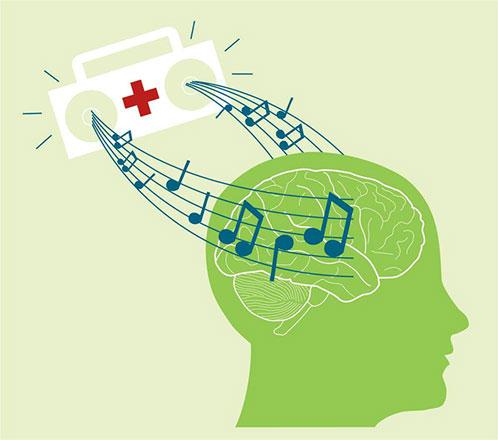You are here
Music therapy may help ease depression
By Thomson Reuters Foundation - Dec 14,2017 - Last updated at Dec 14,2017

Photo courtesy of theglobeandmail.com
Traditional depression treatments like psychotherapy or medication might work better for some patients when doctors add a dose of music therapy, a research review suggests.
Researchers examined data on 421 people who participated in nine previously completed short-term experiments testing the benefits of music therapy on its own or added to traditional interventions for depression.
Overall, the analysis found patients felt less depressed when music was added to their treatment regimen, according to the analysis in the Cochrane Library.
Music therapy also appeared to help ease anxiety and improve functioning in depressed individuals, and it appeared just as safe as traditional treatments.
“We can now be more confident that music therapy in fact improves patients’ symptoms and functioning, and that this finding holds across a variety of settings, countries, types of patients, and types of music therapy,” said senior study author Christian Gold of Uni Research Health in Bergen, Norway.
More than 300 million people worldwide have depression, which is projected to become the leading cause of disability by 2020, Gold and colleagues write.
Music therapy can include passive approaches that involve listening, active treatments that involve playing an instrument or singing or participating in a musical performance, or some combination of these approaches. What sets therapy apart from other musical endeavors is that it is typically led by a person with training in counseling, psychology or treating depression.
Even though music therapy has long been used all over the world, research to date has not offered a clear picture of its benefits, Gold said.
The last review of music therapy published by Cochrane in 2008 did not offer as much evidence of benefits, Gold said. A milestone study that came out in 2011 concluded that music could help but was only done in one country and left many unanswered questions, he said.
“The present review update confirms these findings and broadens them,” Gold said by e-mail. “We still think that more research is needed; however, we feel that research on music therapy for depression can now turn to more specific questions, such as comparing different types of therapy to each other.”
Studies included in the current review ranged in duration from six to 12 weeks. The smallest study had just 14 participants, and the largest one included 79 people.
The total number of treatment sessions ranged from eight to 48, and the duration of sessions varied from 20 minutes to two hours.
Only one of the studies in the analysis compared active versus passive music therapy, and it did not find a difference in the short-term severity of depression.
“The most important finding is that music therapy shows short-term beneficial effects for people with depression when added on top of baseline psychological or pharmacological treatment,” said Dr. Gjin Ndrepepa, a researcher at Technical University in Munich, Germany, who was not involved in the study.
How it works is not clear, Ndrepepa said by e-mail.
But modern brain imaging studies have shown that music therapy activates regions of the brain that are involved in regulating emotions. Joyful and sad music can have different effects, too, Ndrepepa added.
More research is still needed to figure out what type of music therapy works best for specific patient situations, Gold said.
Related Articles
A nerve stimulation device from Cyberonics improved cardiac function in heart failure patients in a small clinical trial, in contrast to an unsuccessful study backed by Boston Scientific.
LONDON — Psilocybin, the psychedelic compound in magic mushrooms, may one day be an effective treatment for patients with severe depre
People with chronic health problems who suffer from depression may find their mood improve when they do aerobic exercise, a research review
















